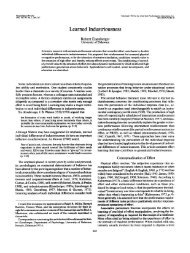Perceived Organizational Support
Perceived Organizational Support
Perceived Organizational Support
Create successful ePaper yourself
Turn your PDF publications into a flip-book with our unique Google optimized e-Paper software.
Coyle-ch10.qxd 1/16/04 3:00 PM Page 210<br />
210 Exchange Nature of Employment Relationship<br />
of fairness, procedural justice has been found to contribute more strongly to POS<br />
than distributive justice (Fasolo 1995; Wayne et al. 2002).<br />
Shore and Shore (1995) suggested that perceptions of fairness surrounding a<br />
particular decision contribute to a more global history of support. Although employees<br />
would remember a few important organizational decisions that contribute to<br />
POS, less important decisions that also contribute to POS would tend to be forgotten.<br />
The accumulated history of decisions would operate through POS to influence<br />
employee attitudes and performance. In accord with this view, Moorman et al.<br />
(1998) found that POS fully mediated the association between procedural justice<br />
and extra-role behavior. Longitudinal research to assess the causal direction of the<br />
relationship between POS and fairness would be helpful to provide more definitive<br />
evidence concerning these relationships.<br />
Research on fairness has also considered the relative contributions made by<br />
procedural justice and interactional justice to POS. Interactional justice refers to<br />
employees’ perceptions of the favorableness of an interpersonal interaction accompanying<br />
decisions of resource allocation (Bies and Moag 1986). Masterson et al.<br />
(2000) reasoned that because procedural justice results from actions of the organization,<br />
and interactional justice results from individuals’ actions, the two types of<br />
fairness should differentially influence employees’ social exchange relationships with<br />
the organization and with representatives of the organization. <strong>Support</strong>ing these<br />
hypotheses, Masterson et al.’s study of university employees found that procedural<br />
justice was predictive of POS, whereas interactional justice from supervisors was<br />
predictive of the quality of employees’ exchange relationship with their supervisors.<br />
10.3.2 <strong>Support</strong> from organizational representatives<br />
According to OST, employees incorporate the favorable treatment received from<br />
various organizational agents and units into an overall perception of organizational<br />
support. OST assumes treatment received from an organizational agent contributes<br />
to POS to the extent that the representative’s actions are believed to be sanctioned<br />
and promoted by the organization, as opposed to being seen as idiosyncratic motives<br />
of the agent. In general, the higher the status or standing the employee believes the<br />
organizational agent has within the organization, the more the employee should<br />
attribute the actions of that agent to the intent of the organization. The actions and<br />
words of high status employees are seen as closely conveying the favorable or<br />
unfavorable orientation toward employees of the personified organization.<br />
The perceived status of an agent would be influenced by the agent’s formal<br />
position in the organizational hierarchy. However, perceptions of status are also<br />
influenced by one’s treatment by others, allowing individuals with similar job titles<br />
to differ markedly in the extent to which they are viewed to represent the organization.<br />
<strong>Organizational</strong> agents’ status would be influenced by the extent of the<br />
positive valuation and regard extended to them by the organization, the degree of<br />
job autonomy afforded them, and their influence in important organizational<br />
decisions (Eisenberger et al. 2002). Favorable or unfavorable treatment received from



